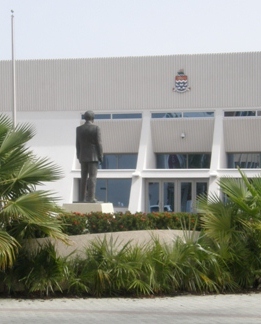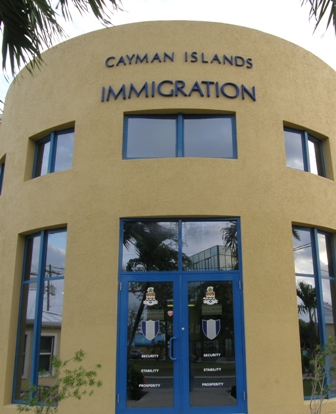Archive for June 15th, 2012

Queen names Caymanians for top royal gongs
 (CNS): In her 2012 birthday honours list the queen has handed out two MBEs as well as one Overseas Territories (Police) Medal to Caymanians. The governor has named two more to receive the Cayman Islands Certificate and Badge of Honour. Martyn Bould, chair of the CNCF board chair, and Dr.Sook Lee Yin-Eccles, who is medical director of the Cancer Society, have been made MBEs for their respective services to cultural preservation and medicine and charitable organisations. Davis Harrison Scott, a senior officer with the RCIPS, received the OTM for meritorious service. Meanwhile, Governor Duncan Taylor has named Nicole Tyson-Petit and James Young Scott as CERT Hons for their work in government and the construction industry.
(CNS): In her 2012 birthday honours list the queen has handed out two MBEs as well as one Overseas Territories (Police) Medal to Caymanians. The governor has named two more to receive the Cayman Islands Certificate and Badge of Honour. Martyn Bould, chair of the CNCF board chair, and Dr.Sook Lee Yin-Eccles, who is medical director of the Cancer Society, have been made MBEs for their respective services to cultural preservation and medicine and charitable organisations. Davis Harrison Scott, a senior officer with the RCIPS, received the OTM for meritorious service. Meanwhile, Governor Duncan Taylor has named Nicole Tyson-Petit and James Young Scott as CERT Hons for their work in government and the construction industry.

Opposition boycotts LA
 (CNS): The opposition members and the member for North Side all boycotted what they described as unlawful proceedings in the Legislative Assembly on Friday, after the premier called a meeting which the six members said was unconstitutional. For the second time in the last two months the opposition benches remained deliberately empty during the very brief meeting, as a result of the government’s decisions to bend the normal rules, orders and protocols regarding the country’s parliament. The opposition leader has written to the governor about the meeting, which was past the point of when the House should have been prorogued in order to make way for the new budget meeting.
(CNS): The opposition members and the member for North Side all boycotted what they described as unlawful proceedings in the Legislative Assembly on Friday, after the premier called a meeting which the six members said was unconstitutional. For the second time in the last two months the opposition benches remained deliberately empty during the very brief meeting, as a result of the government’s decisions to bend the normal rules, orders and protocols regarding the country’s parliament. The opposition leader has written to the governor about the meeting, which was past the point of when the House should have been prorogued in order to make way for the new budget meeting.
Alden McLaughlin said in his letter to the governor that the failure of the government to prorogue the Legislative Assembly was “without question” in his purview as it was a constitutional issue.
“The conduct of the Legislative Assembly and the routine abuse of the Standing Orders and parliamentary conventions by the current government are notorious and well documented,” McLaughlin wrote, adding that he believed the integrity of the parliamentary process was being undermined as a result because they affect the ability of the opposition members to play their constitutional role in properly scrutinizing the government.
“The present situation of no budget having yet been presented with only 2 weeks left in the current fiscal year is but another very grave example of the unrelenting downward spiral in the state of governance in these Islands. Arguably, these are all matters which are within your constitutional remit as governor," he wrote.
McLaughlin pointed out that at a Business Committee on Thursday there was no news on when the budget session would be called, just two weeks away from the end of the financial year.
Instead, the premier told the committee that a 6th meeting of the 2011-2012 session of the Legislative Assembly would be held Friday morning.
“No reasonable explanation was provided to the Committee as to why the State Opening was not proceeding and no date was given to members as to when the Budget would be ready for presentation,” the opposition leader wrote to the governor. “When pressed, the Premier would only say that 'the budget was in the hands of our lords and masters'."
McLaughlin set aside the inadequate notice to members as well as the concerns about when the budget would be delivered, but said that above all the Friday's meeting was unconstitutional. Sections 83 and 84 of the Constitution say there must be at least one session of the Legislative Assembly in every calendar year and the governor, should prorogue the Legislative Assembly annually.
As the House was last prorogued on 20 May 2011 and the last session of the Legislative Assembly was proclaimed on 23 May, it should have been prorogued by 22 May this year.
“That has not been done and the 2011-2012 session has expired since by virtue of section 84 of the Constitution the Legislative Assembly is required to be prorogued at least annually,” he wrote.
Ezzard Miller pointed out that he was forced to boycott proceedings, otherwise he would be condoning the unconstitutionality of the meeting and described it as a “sham” and totally unnecessary.
The House was adjourned this morning (Friday 15 June) after Bush made two speeches, presented a report on the term limits and moved a motion that the current government bills from the 2011/12 session be carried over to the next. However, the premier has not given a date for when the Legislative Assembly’s new parliamentary year will begin with the presentation of the budget.
Although the UDP government has left its budget presentation until the eleventh hour each year since coming to office, this time the administration may even fail to make the 30 June deadline, which could present a genuine financial crisis for the running of government from 1 July. With no appropriation law passed, it will not be able to pay bills, salaries or meet any other financial obligations as it will not have the legal authority to spend public money.
See opposition leader’s letter to the governor below.

Mac claims surplus budget
 (CNS): Despite being presented with financial requirements of close to $630 million from government, the premier claimed this morning that his administration has cut operational expenditure for 2012/13 enough to present a balanced budget and modest borrowing to the UK. Bush told the Legislative Assembly, which was boycotted by the opposition who said it was an unconstitutional sitting, that he was waiting on approval from the FCO in order to allow him to present the spending plans for next year in the new session of the House. Sources tell CNS that approval is unlikely to be forthcoming, however, without further changes.
(CNS): Despite being presented with financial requirements of close to $630 million from government, the premier claimed this morning that his administration has cut operational expenditure for 2012/13 enough to present a balanced budget and modest borrowing to the UK. Bush told the Legislative Assembly, which was boycotted by the opposition who said it was an unconstitutional sitting, that he was waiting on approval from the FCO in order to allow him to present the spending plans for next year in the new session of the House. Sources tell CNS that approval is unlikely to be forthcoming, however, without further changes.
Although the government believes it has presented a balanced budget, the calculations do not include capital expenditure and the figures fall far short of the targeted $60 million set out in the UDP's original three year plan. McKeeva Bush has claimed that the eleventh hour budget dovetails with the strategic policy statement he delivered last December and should satisfy the UK, despite a borrowing request.
Bush made no mention of the size of the deficit now anticipated for the close of the 2011/12 financial year and whether any further borrowing would be required to plug that hole.
In his statement Friday morning Bush claimed that responsible financial management remained a priority for his administration and it had worked hard to try and hone down spending requests, which had exceeded his $498 million target set for the civil service in January by some $130 milllion.
Bush did not make it clear how much of the excess was ultimately cut before the budget was sent to the UK or whether revenue predictions were sufficiently high to sustain spending levels above his January target.
"Ministers have been deliberating assiduously to remove this excess in order to present a more sustainable budget to the Legislative Assembly," the premier stated. "We got it down to $81 million and then we had to work even harder to cut that $81 million down."
He did not reveal the final figure but said it had a "modest surplus" and “very modest long-term borrowing" for things such as the solar energy programme, the young offenders centre, the primary and Clifton Hunter schools.
Bush hit back at the opposition’s criticisms of his budget and pointed the finger at the PPM, saying that the delay to the presentation of the budget was because government needed UK approval first, as a result of the previous administration destroying the country's finances.
"If Mr McLaughlin had not saddled the country with two school buildings at $100 million each and an administration building of $108 million, roads in the millions not yet paid for but which my government has been struggling with, then the budget and the other three I presented would not be so severely burdened," he added, as he accused him of mismanagement of public finances.
The clock is ticking on the need for government to present a budget and pass the appropriations law before the end of this month. Without that legislation, as of midnight on 30 June, government will have no legal authority to spend any money at all.
See the premier's full statement in the Legislative Assembly below.

Review calls for 10 yr rollover
 CNS): A government appointed committee has recommend that the key employee provision in the immigration law be abolished and a ten year term limit introduced to address the issue of the controversial rollover policy. A report by the term limit review committee, established by government last year, was tabled in the Legislative Assembly on Friday in order to start a public consultation period on the committee’s findings and recommendations on the way forward in dealing with government's need to balance an expatriate workforce with the needs of Caymanians.
CNS): A government appointed committee has recommend that the key employee provision in the immigration law be abolished and a ten year term limit introduced to address the issue of the controversial rollover policy. A report by the term limit review committee, established by government last year, was tabled in the Legislative Assembly on Friday in order to start a public consultation period on the committee’s findings and recommendations on the way forward in dealing with government's need to balance an expatriate workforce with the needs of Caymanians.
See full story Key-wrong-way-chose

Realities & Rhetoric of One Man, One Vote
The decision to change a country’s voting system has far reaching political consequences that should not be taken lightly; and when we as citizens are asked to make critical decisions like this, it is important to make our choices based on facts, rather than emotion. The one man, one vote (OMOV) has become an emotive issue that is dividing our community.
Lines have been drawn on the basis of political orientation, and as one would expect in any political debate there are two sides – those that are for and those that are against. But behind all of the emotion and political rhetoric, what are the facts?
According to the advocates of OMOV/single-member constituencies, this system will guarantee better “equality, accountability and fairness” and it will introduce “a modern approach to political organization and voting systems to the Cayman Islands”.
These are noble objectives for any country; however, if we accept these ideals as the reason to change our electoral system, then what we are clearly saying is that the current system of voting that we have used to elect successive governments for the past 40 years was flawed, unequal, and unfair.
But is that really the case? Are we saying that the electoral system that elected such stalwarts and statesmen as Mr Cradock, Mr Jim Bodden, Miss Annie, Mr Benson and Captain Mabry is useless and outdated and now needs to be replaced? Are we saying that our current electoral system which required these members to cooperate and get along for the good of the country — whichever side they were on — is no longer useful and relevant to modern-day Cayman? If we vote 'yes' to the upcoming referendum, then we are clearly saying 'yes' to all of these questions.
While our current electoral system is not without its share of flaws, it can be amended and improved, but the current referendum does not provide us with that option. In fact, there are several different types of electoral systems that we could consider. Before we start tampering with something as important our electoral system, perhaps we should all read and gather our information from objective non-partisan sources, rather than acting on the basis of who shouts the loudest or who we like and don’t like.
Franklin D. Roosevelt once said, “The real safeguard of democracy is education.” Therefore we should educate ourselves before voting on the referendum. There are several good books and research papers that can help guide us to make the right decision.
One such book is Behind the Ballot Box, A Citizen’s Guide to Voting Systems by Douglas J. Amy, (Praeger Publishing, 2000). This book is a useful guide for anyone who wants to learn more about voting systems and their political implications. It gives readers all the information and analytical tools they need to make an intelligent choice among voting systems. It provides a set of political criteria that can be used to judge voting systems. It gives detailed descriptions of all the common voting systems used in the United States and other Western democracies and provides an analysis of the various political advantages and disadvantages associated with each type of system. And most of all, it doesn’t have a viewpoint that is slanted by the PPM, UDP, CNS, Rooster or the OMOV proponents.
On the issue of single-member constituency (SMC), the author, Douglas J. Amy, agrees that SMC is good at ensuring that all local geographical areas have a voice in the legislature. On the other hand he also cautions that it tends to reinforce the two-party system, produce manufactured majorities, encourage gerrymandering, discourage voter turnout, create high levels of wasted votes, and deny fair representation to third parties, racial minorities and women.
If academics like Amy can make these kind statements about the OMOV system, is this really a more “modern approach to political organization and voting"? Would this really represent an improvement in our democracy? How would independent candidates get elected in such a system?
Let’s now examine how the OMOV system would guarantee equality and fairness.
With the OMOV system the winners need not collect a majority of the votes, only more votes than their opponents. So, if candidate A receives 40% of the vote, candidate B receives 35%, and candidate C gets 25% then candidate A wins the seat. But this would mean that 55% of the electorate would not be represented by the candidate of their choice. How can this be considered “fair and equal?”
According to thefreedictionary.com, one man, one vote is a principle that was enunciated by the US Supreme Court in (Reynolds v. Sims,1964) which stated that all citizens, regardless of where they reside in a state, were entitled to equal legislative representation. The Supreme Court ruled that a state's apportionment plan for seats in both houses of a “bicameral state legislature” must allocate seats on a population basis so that the voting power of each voter be as equal as possible to that of any other voter.
Under our current electoral system we already have equal legislative representation – on the basis of district size; however, we do not yet have a bicameral legislature. Therefore, if the OMOV referendum is successful in July, will the next step be a move to make changes to our current Constitution to introduce a bicameral legislature? Is this the real hidden agenda behind the OMOV movement or is it just an unexpected outcome?
Whenever we make our decisions based on the facts it will reduce the likelihood of unexpected outcomes. So here are some more facts on the origins of the OMOV:
A quick look at Wikipedia reveals that “One Man, One Vote” is a slogan that has been used in many parts of the world in campaigns for “universal suffrage” and it is particularly prevalent in “less developed countries” during the “period of decolonisation and the struggles for national sovereignty”.
Is this the hidden political agenda behind the OMOV movement — to lead us on a fight for national sovereignty and towards decolonisation? While I do not believe that many of the supporters of the OMOV are necessarily advocates of decolonisation, there is a possibility that their enthusiasm is being manipulated by some who seek to achieve a higher agenda. We are opening a Pandora's Box, and I am not sure that enough research has yet been done to fully understand the pros and cons of this issue.
While no system is perfect, we certainly know what we have, but we sure don’t know what the heck we’re getting into!
MOU with CHEC 1 year old
(CNS): It is now twelve months since the premier first signed a Memorandum of Understanding with China Harbour Engineering Company to enter negotiations over the George Town cruise berthing facilities. When McKeeva Bush signed the deal to start exclusive talks with the Beijing firm and pulled out of talks with GLF Construction he said CHEC would get the project moving more quickly. Despite these claims, the port project remains stalled in the face of extensive controversy surrounding the Chinese firm, mounting local opposition to the choice, as well as a clear message from the UK that as things stand it cannot support the development.
After one year of talks with the Chinese the cruise berthing facilities still seem a distant goal for the UDP administration. Three years into the UDP government a port now seems less likely to happen than it did on the day Bush terminated the GLF talks in April 2011. At the time that firm along with its local partners Royal Construction had said they were no more than six weeks away from mobilization and the start of the piers. Had the premier made the decision to stick with GLF and move to a main agreement the first pier would now be finished.
Despite Bush’s claims that he wanted to get the port going and that CHEC is the best partner for the public-private project, in the last twelve months there has been little evidence of progress towards a start date. Most updates regarding the talks have come through leaks or FOI requests that have revealed CHEC’s desire for a 49-51 year lease, a share of the port fees, a plan for a two tier upland terminal of some 100,000 square feet and plans for a casino. The project has been described as ballooning in cost as it grows from an estimated $150 million development to one expected to exceed $300 million.
The choice of CHEC has brought significant opposition from many who depend on cruise tourism for their livelihoods as well as the Cayman Contractors Association – groups that are fully supportive of the need for the piers.
However, because of concerns over the firm’s reputation as well as the belief that CHEC is likely to exclude both local workers and businesses from the project, Bush’s choice of partner has very little support from the community or even members of his own political party. The premier terminated talks with GLF in April 2011 despite recommendations that government should give the contract to GLF from the then port board chair, Stefan Baraud, a former UDP party chairman, and from UDP backbench MLA Cline Glidden, who was the port project's lead negotiator.
Bush ignored those recommendations and signed the MOU with CHEC on 13 June 2011 to design, build and finance the George Town facilities, a pier in West Bay and the renovation of the Spotts Jetty, with a lease period of 49 – 51 years. He then placed Ellio Solomon in the role as lead negotiator with the Chinese.
The decision to dump GLF and go with CHEC has not only stalled the project and raised significant controversy but it also cost the public purse more than $2.5 million in a settlement with GLF because of the breach in the terms of the Framework Agreement when Bush made the unilateral decision to stop the talks.
Up until last week, however, despite news about CHEC and its parent company being banned by the World Bank and revelations of people being imprisoned and even facing execution after accepting bribes from the firm, the premier has insisted that CHEC remains the right partner for Cayman.
Currently, auditors KPMG are undertaking a review of the proposed project and the premier has been advised by both the auditor general and the chair of the Central Tenders Committee on the way forward for getting the project back in line with international best practice. The UK has stated that it cannot support the proposal at present and bringing the project back in line with best practice may require a full tendering process.